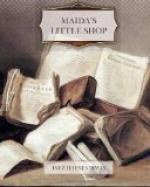“Dicky Dore, ma’am,” the boy answered respectfully.
“Well, Oi don’t see why you shouldn’t thry ut, acushla,” she said to Maida. “A half an hour iv’ry avening after dinner. Sure, in a wake, ’twill be foine and grand we’ll be wid the little store running like a clock.”
“We’ll begin next week, Monday,” Maida said eagerly. “You come over here right after dinner.”
“All right.” The little lame boy looked very happy but, again, he did not seem to know what to say. “Thank you, ma’am,” he brought out finally. “And you, too,” turning to Maida.
“My name’s Maida.”
“Thank you, Maida,” the boy said with even a greater display of bashfulness. He settled the crutches under his thin shoulders.
“Oh, don’t go, yet,” Maida pleaded. “I want to ask you some questions. Tell me the names of those dear little girls—the twins.”
Dicky Dore smiled his radiant smile. “Their last name’s Clark. Say, ain’t they the dead ringers for each other? I can’t tell Dorothy from Mabel or Mabel from Dorothy.”
“I can’t, either,” Maida laughed. “It must be fun to be a twin—to have any kind of a sister or brother. Who’s that big boy—the one with the hair all hanging down on his face?”
“Oh, that’s Arthur Duncan.” Dicky’s whole face shone. “He’s a dandy. He can lick any boy of his size in the neighborhood. I bet he could lick any boy of his size in the world. I bet he could lick his weight in wild-cats.”
Maida’s brow wrinkled. “I don’t like him,” she said. “He’s not polite.”
“Well, I like him,” Dicky Dore maintained stoutly. “He’s the best friend I’ve got anywhere. Arthur hasn’t any mother, and his father’s gone all day. He takes care of himself. He comes over to my place a lot. You’ll like him when you know him.”
The bell tinkling on his departure did not ring again till noon. But Maida did not mind.
“Granny,” she said after Dicky left, “I think I’ve made a friend. Not a friend somebody’s brought to me—but a friend of my very own. Just think of that!”
At twelve, Maida watched the children pour out of the little schoolhouse and disappear in all directions. At two, she watched them reappear from all directions and pour into it again. But between those hours she was so busy that she did not have time to eat her lunch until school began again. After that, she sat undisturbed for an hour.
In the middle of the afternoon, the bell rang with an important-sounding tinkle. Immediately after, the door shut with an important-sounding slam. The footsteps, clattering across the room to the show case, had an important-sounding tap. And the little girl, who looked inquisitively across the counter at Maida, had decidedly an important manner.
She was not a pretty child. Her skin was too pasty, her blue eyes too full and staring. But she had beautiful braids of glossy brown hair that came below her waist. And you would have noticed her at once because of the air with which she wore her clothes and because of a trick of holding her head very high.




